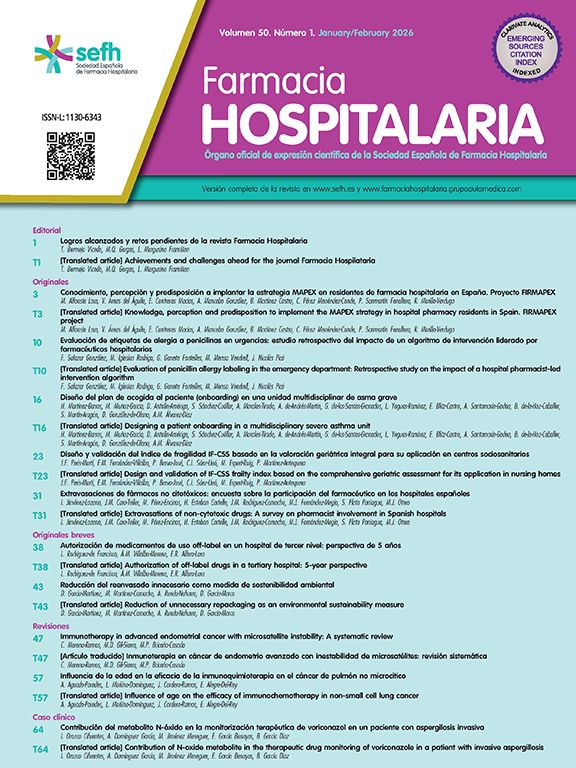The initiative of the Spanish Society of Hospital Pharmacy (SEFH) aimed at promoting the development of professional skills among hospital pharmacy specialists has brought Spain to the forefront in Europe regarding the number of pharmacists certified by the Board of Pharmacy Specialties (BPS), especially in the field of oncology pharmacy. The SEFH has promoted a range of initiatives to extend BPS certification1 including preparation and recertification courses. This commitment also involves future-oriented perspectives embodied in the 2030 SEFH Project, which outlines the proposed standard: “Hospital pharmacy departments should encourage hospital pharmacists to pursue certification and recertification in accordance with the SEFH training and education model. Additionally, training in areas of specialization (BPS, masters, or duly-certified/acknowledged postgraduate training courses) should be offered to pharmacists”.
The BPS was established by the American Pharmacists Association (APhA) in 1976 as an autonomous agency for the recognition and certification of advanced skills in pharmacy.3 The BPS currently awards certifications across 15 specialties including pharmacotherapy; oncology pharmacy; psychiatric pharmacy; pediatric pharmacy; critical care pharmacy and infectious disease pharmacy, among others. By 2025, 287 pharmacists held BPS certification (four with dual certification) across nine specialties in Spain, notably including the Board Certified Oncology Pharmacist (BCOP) with 156 pharmacists (54%), and the Board Certified Pharmacotherapy Specialist (BCPS) with 66 (23%).3
The BPS certification has currently become an internationally recognized authority for the accreditation of pharmacists, not only in the USA but also in many other countries. The high number of BSP-certified pharmacists in Spain demonstrates the interest and effort of this community to acquire advanced skills in specific clinical areas.4 This tendency is also driven by increased clinical complexity, emerging clinical pharmacy skill requirements, and the development of new subspecialties.
On another note, training and certification in specialty areas should be offered to hospital pharmacy residents through integration in professional development plans. In the field of hospital pharmacy, plans for the development of new specialty areas should incorporate mechanisms for the continuous updating of hospital pharmacy specialist skills.2 Theoretically, the value of this certification lies in the fact that it documents the impact of certified pharmacists on economic, clinical and humanistic outcomes.5
Likewise, as healthcare professionals aware of their professional responsibility, hospital pharmacists should continuously update and improve their skills and knowledge to optimize patient care. Certification is one of the most solid methods for meeting pharmacists' commitment to patient safety, quality of care and professional development.4
However, efforts should be directed toward adopting a pragmatic approach to the specialty certification model at the regional or national level. Advances in this direction have been made in the recertification model by integrating continuous professional development activities.3
In this regard, efforts must continue toward integrating the hospital pharmacist certification and recertification model, which—aligned with the SEFH's training model in hospital pharmacy specialty areas—represents a key component in achieving higher standards of excellence in healthcare delivery.
CRediT authorship contribution statementJosep Maria Guiu Segura: Writing – review & editing, Writing – original draft, Visualization, Conceptualization.
FundingThis study did not receive any funding.
The author is currently a member of the Board of Directors of BPS.






